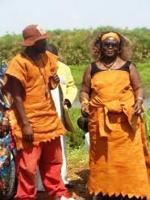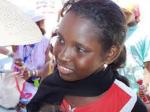Learn Swahili / Kishwahili
Do you want to learn Swahili before you go for you vacation to Kenya or any Swahili nation in Africa? this site has some Kiswahili basic s for you.
JAMBO is one of the most common words you will hear spoken throughout Kenya. This is the simplest Swahili greeting, and is often the first word learned by visitors to Kenya. Swahili (locally referred to as KiSwahili) is Kenya's national language.
History of Swahili Language in Kenya
Swahili originated on the East African coast, as a trade language used by both Arabs and coastal tribes. The language incorporated elements of both classical Arabic and Bantu dialects, and became the mother tongue of the Swahili people who themselves rose from the intermarriage of Arab and African cultures.
The word Swahili itself came from the Arabicfor 'coast' Sahel. But the language became a pervasive influence, and a regional lingua franca, becoming widely used throughout Kenya and Tanzania. Today, the language is also used in regions of Ethiopia, Sudan, Uganda, Rwanda, Burundi, the Congo and Zambia, and is the most widely spoken African language. In Kenya, most people generally speak a tribal language at home, use Swahili as an everyday language, and English for business.
Swahili is a relatively simple language, being highly phonetic with a rigid grammar. The only difficulty in learning Swahili comes from the extensive use of prefixes, suffixes and infixes, and a class system for nouns.
Coastal Swahili remains the most pure, and the Island of Zanzibar is considered the home of the language.
The further away from the coast that you travel, the less sophisticated the language generally becomes, and grammar is slightly more flexible. Nairobi has now become the home of Sheng, a fashionable Creole of Swahili, Kikuyu, English and slang.
Still, even a little Swahili goes a long way in Kenya. It is worth learning a little, and most Kenyans are thrilled to hear visitors attempt to use any Swahili at all.
The following guide will let you try out some basic Swahili:
LEARN SWAHILI - USEFUL GREETINGS
Jambo or Hujambo Hello, good day, how are you? (multy-purpose greeting, means"problems?")
Jambo or Sijambo (the response)No problems
Habari? How are things? (literally"news?")
Nzuri Fine, good, terrible
Hodi! Hellow? Anyone in? (said on knocking or entering)
Karibu Come in, enter, welcome(also said on offering something)
Kwaheri/ ni Goodbye to one/ many
Asante/ ni Thank you to one/ many
Sana Very(acommon emphasis)
Bwana Mister, the equivalent of monsieur in French
Mama Like the French madame or madamoiselle, for adult women
Kijana Youth, teenager(pl,vijana)
Mtoto Child, kid(pl,watoto)
Jina lako nani? What’s your name?/ What
Unaitwaje? Are you called?
LEARN SWAHILI - BASICS
My name is / I am called Jina langu ni/ Ninaitwa
Where are you from? Unatoka wapi?
Where are you staying? Unakaa wapi
I am from Ninatoka
I am staying (at / in). Ninakaa
See you Tutaonana ( Lit. "We shall meet")
Yes Ndiyo (Lit. it is so)
No Hapana
I don’t understand Sifahamu / Sielewi
I don’t speak Swahili but Sisemi Kiswahili, lakini
How so you say in Swahili? Unasemaje na Kiswahili
Could you repeat that? Sema tena (Lit. speak again)
Speak slowly Sema pole pole
I don’t know Sijui
Where? Wapi?
Here Hapa
When? Lini?
Now Sasa
Soon Sasa hivi
Why? Kwa nini?
Because Kwa sababu
Who? Nani?
What? Nini?
Which? Gani?
True kweli
And/with na
Or au
(It) is (they) are Ni (a useful connector when you cant think of any)
Isn’t it? Siyo?
I’m British / American / German / French / Italian Mimi Mwingereza / Mwamerika / Mdachi / Mfaransa / Mwitaliano
LEARN SWAHILI - DAILY NEEDS
Where can I stay? Naweza Kukaa wapi?
Can I stay here? Naweza kukaa hapa?
Room/s Chumba/vyumba
Bed/s Kitanda/vitanda
Chair/s Kiti/viti
Table/s Meza
Toilet, bathroom Choo, bafu
Washing water Maji ya kuosha
Hot/cold water Maji moto/baridi
I’m hungry Ninasikia njaa
I’m thirsty Nina kiu
Is there any? Iko… or Kuna?…
Yes there is… Iko…or kuna…
No there isn’t any Hakuna
How much? Ngapi?
money Pesa
What price? Bei gani?
How much does it cost? Pesa Ngapi?
I want… Nataka
I don’t want Sitaki
Give me/Bring me (can I have?) Nipe/Niletee
Again Tena
Enough Tosha/basi
Expensive Ghali/sana
Cheap(also"easy") Rahisi
Fifty cents Sumni
Reduce the price,come down a little Punguza kidogo
Shop Duka
Bank Benki
Post office Posta
Café,restaurant Hoteli
Telephone Simu
Cigarettes Sigara
I’m ill Mimi mgonjwa
Doctor Daktari
Hospital Hospitali
Police Polisi
LEARN SWAHILI - TRAVEL AND DIRECTIONS
Bus/es Bas,basi / mabasi
Car /s, Vehicle/ s Gari/ Magari
Taxi Teksi
Bicycle Baiskeli
Train Treni
Plane Ndege
Boat / Ship Chombo / Meli
Petrol Petroli
Road, path Njia/ ndia
Highway Barabara
On foot/ Walking Kwa miguu
When does it leave Inaondoka lini?
When will you arrive? Tutafika lini?
Slowly Polo pole
Fast, quickly Haraka
Wait! / hang on a moment! Ngoja!/ ngoja kidogo!
Stop! Simama!
Where are you going Unaenda wapi
To where? Mpaka wapi?
From where? Kutoka wapi?
How many kilometers? Kilometa ngapi?
I’m going to Naenda
Move along, squeeze up a little Songa!/ songa kidogo!
Let’s go, carry on Twende, endelea
Straight ahead Moja kwa moja
Right Kulia
Left Kushoto
Up Juu
Down Chini
I want to get off here Nataka kushuka hapa
The car has broken down Gari imearibika
LEARN SWAHILI - TIME CALENDAR AND NUMBER
What time is it? Saa ngapi
Four o’clock Saa nne
Quarter past Na robo
Half past Na nusu
Quarter to Kasa robo
Minutes Dakika
Early Mapema
Yesterday Jana
Today Leo
Tomorrow Kesho
Day time Mchana
Night time Usiku
Dawn Alfagiri
Morning Asubuhi
Last/ this/ next week Wiki iliopita/ hii/ ijayo
This year Mwaka huu
This month Mwezi huu
Monday Jumatatu
Tuesday Jumanne
Wednesday Jumatano
Thursday Alhamisi
Friday Ijumaa
Saturday Jumamosi
Sunday Jumapili
1 Moja
2 Mbili
3 Tatu
4 Nne
5 Tano
6 Sita
7 Saba
8 Nane
9 Tisa
10 Kumi
11 Kumi na moja
12 Kumi na mbili
20 Ishirini
21 Ishirini na moja
30 Thelathini
40 Arobaini
50 Hamsini
60 Sitini
70 Sabini
80 Themanini
90 Tisini
100 Mia moja
121 Mia moja na ishirini na moja
1000 Elfu
LEARN SWAHILI - SIGNS
Danger! Hatari!
Warning! Angalia!/ Onyo!
Fierce dog! Mbwa mkali!
No entry! Hakuna njia!
LEARN SWAHILI - WORDS WORTH KNOWING
Good -zuri(with a prefix at the front)
Bad -baya(ditto)
Big -kubwa
Small -dogo
A lot of -ingi
Other/ Another Ingine
Not bad Si mbaya
Ok, right, fine Sawa
Fine, cool Safi
Completely Kabisa
Just, only Tu(kitanda kimoja tu-just ona bed)
Thing/ s Kitu/ vitu
Problems, hassles Wasiwasi, matata
No problem Hakuna wasiwasi/ Hakuna matata
Friend Rafiki
Sorry, pardon Samahani
It’s nothing Si kitu
Excuse me (let me through) Hebu
What’s up? Namna gani?
If God wills it Inshallah (heard often on the coast)
Please Tafadhali
Take a picture of me! Piga picha mimi!
Help the poor! Saidia maskini!
More Pages
Kenya Art | Kenya Festivals | Kenya Gender Issues | Kenya Gestures | Kenya Greetings | Kenya History | Kenya Language | Kenya Literature | Kenya Modern Culture | Kenya Music | Kenya National Anthem | National Dress Cord of Kenya | Kenya People | Kenya Respect | Kenya Taboos | Kenya Television and Culture |Recent Articles
-
Garam Masala Appetizers ,How to Make Garam Masala,Kenya Cuisines
Sep 21, 14 03:38 PM
Garam Masala Appetizers are originally Indian food but of recent, many Kenyans use it. Therefore, on this site, we will guide you on how to make it easily. -
The Details of the Baruuli-Banyara People and their Culture in Uganda
Sep 03, 14 12:32 AM
The Baruuli-Banyala are a people of Central Uganda who generally live near the Nile River-Lake Kyoga basin. -
Guide to Nubi People and their Culture in Kenya and Uganda
Sep 03, 14 12:24 AM
The Nubians consist of seven non-Arab Muslim tribes which originated in the Nubia region, an area between Aswan in southern







New! Comments
Have your say about what you just read! Leave me a comment in the box below.